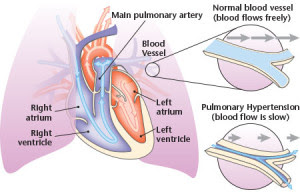Definition, Treatment, and Symptoms of Pulmonary Hypertension
Defining Pulmonary Hypertension
Pulmonary hypertension is a life-threatening high-blood pressure disease that affects the right side of the heart, and the arteries inside of the lungs.
The reason pulmonary hypertension develops is because the tiny arteries in your lungs, which are referred to as pulmonary arteries, and the capillaries become clogged, narrowed, or even destroyed completely.
When this occurs it makes it increasingly difficult for blood to flow freely through your lungs, which then causes a rise in pressure within your lungs' arteries.
The constant built-up pressure begins to add additional stress onto your heart, specifically the right ventricle (right side of your heart), causing your heart to work harder in order to push blood through your lungs.
This will eventually cause your heart to weaken and with further damage, fail totally.
Symptoms of Pulmonary Hypertension
Something worth noting when discussing the symptoms attributed with pulmonary hypertension, often the signs and symptoms of pulmonary hypertension go unnoticed for months if not years.
When this disease progresses to the extent of you experiencing symptoms they can include:
- Shortness of breath, known as dyspnea, occurring during exercise at the beginning and eventually during rest.
- Chest pain/pressure
- Fatigue
- Swelling in your ankles and legs (edema)
- Dizziness
- Passing out
Causes of Pulmonary Hypertension
When discussing the causes of pulmonary hypertension you must first understand how a healthy heart works. The heart has two upper and lower chambers. Every time blood travels through the hearts lower right chamber, the right ventricle, blood is then delivered to the lungs through a blood vessel known as the pulmonary artery. Once exposed to the lungs the blood releases carbon dioxide, replacing it with oxygen. The oxygen infused blood then flows through the many blood vessels in the lungs leading to the left side of the heart.
When the exact cause for high blood pressure in the lungs is unknown then pulmonary hypertension is referred to as idiopathic pulmonary hypertension (IPH). IPH can also be diagnosed when patients have a gene deficiency, which puts them at a higher risk of developing the disease.
If the patients pulmonary hypertension is caused by an additional medical condition, then it is referred to as secondary pulmonary hypertension. Which is far more common than idiopathic pulmonary hypertension. The causes of secondary pulmonary hypertension include:
- Emphysema/chronic obstructive pulmonary disease
- Sleep apnea and other sleeping disorders
- Chronic liver disease (cirrhosis)
- Left-sided heart failure
- Pulmonary fibrosis
- Blood clots in the lungs
- Autoimmune diseases
- HIV
- Sickle cell anemia
Treatment for Pulmonary Hypertension
There is no known cure for pulmonary hypertension, however there are numerous treatment options that your doctor can perform and assess which ones provide the most benefits for your specific health.
As pulmonary hypertension varies by patient, which means treatments that worked for previous patients will not necessarily work for you. Some beneficial treatment options include:
- Supplemental oxygen with a portable or home oxygen concentrator
- Blood vessel dilators
- Cialis
- Blood thinner medications
- Diuretics: medications that help reduce excess fluid from the body
- Anticoagulants: these are medications that prevent the occurence of blood clots within the small pulmonary arteries
- Quit smoking if not already done so
- Be as active as possible
- Eat a healthy well balanced diet
- Get plenty of rest
- Find stress reducing activities





